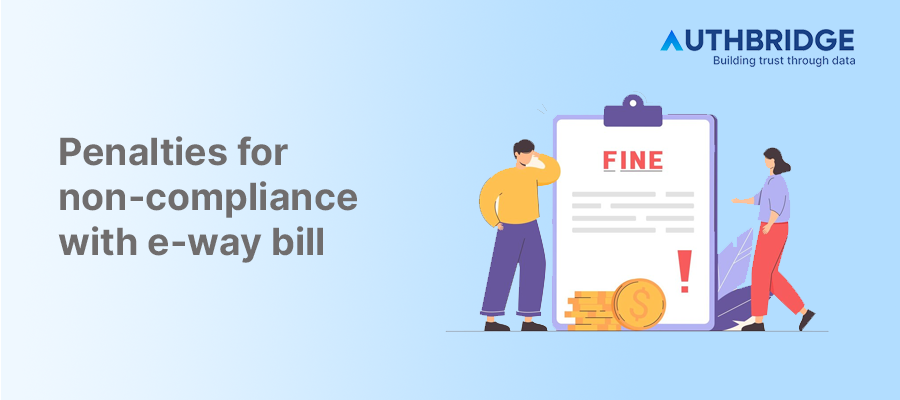Non-Compliance With E-Way Bill: Understanding Penalties And How To Avoid Them

Definition of Non-Compliance
Non-compliance with e-way bill regulations occurs when businesses fail to generate an e-way bill for the transportation of goods where it is mandatorily required under the Goods and Services Tax (GST) framework. This includes not generating the e-way bill, generating it with incorrect details, or failing to carry the e-way bill during the transportation of goods.
Overview of E-Way Bill Requirements
The e-way bill system is a critical component of GST that facilitates the tracking of goods movement across India. It is mandatory for the movement of goods with a value exceeding INR 50,000. The requirements include:
- Generating an e-way bill before the commencement of goods transportation.
- Ensuring the e-way bill is available with the transporter or the person in charge of the conveyance.
- Updating the e-way bill in case of route changes or transfer of goods from one conveyance to another.
Penalties for E-Way Bill Non-Compliance
Monetary Penalties
The GST regime imposes strict penalties for the non-compliance of e-way bill requirements. The penalties are twofold:
- Monetary Penalty: A transporter or consignor who fails to generate an e-way bill for the transport of goods can be fined INR 10,000 or an amount equivalent to the tax sought to be evaded (whichever is higher).
- Detention and Seizure: In addition to monetary fines, the goods and the vehicle transporting them can be detained or seized if they are moved without a valid e-way bill.
Additional Consequences
Non-compliance can also lead to:
- Delayed Deliveries: Detention of goods for non-compliance can result in significant delays in the delivery of goods to the destination.
- Increased Scrutiny: Businesses found non-compliant may be subjected to increased scrutiny from tax authorities, leading to audits and inspections.
- Reputational Damage: Repeated non-compliance can harm a business's reputation, affecting its relationships with partners and customers.
Calculating Penalties for Non-Compliance
Basis for Penalty Calculation
The penalty is calculated based on the value of goods being transported. The table below outlines the penalty structure:
Scenario | Penalty |
If tax sought to be evaded > INR 10,000 | Tax amount sought to be evaded |
If tax sought to be evaded <= INR 10,000 | INR 10,000 |
Examples of Penalty Calculations
- Example 1: For goods worth INR 1,00,000 with an applicable GST rate of 18%, the tax evaded would be INR 18,000. The penalty would be INR 18,000.
- Example 2: For goods worth INR 40,000 with an applicable GST rate of 5%, the tax evaded would be INR 2,000. The penalty would be INR 10,000 (since this is higher than the tax evaded).
Avoiding Penalties for E-Way Bill Non-Compliance
Best Practices for Compliance
- Timely Generation: Ensure e-way bills are generated before the commencement of goods transportation.
- Accuracy: Verify all details entered in the e-way bill for accuracy to avoid discrepancies.
- Awareness: Stay informed about the latest GST and e-way bill regulations to ensure compliance.
Tools and Resources for E-Way Bill Management
Several tools and software solutions are available to help businesses manage e-way bill generation and compliance effectively. These tools often offer features like bulk generation, integration with business systems, and real-time tracking.
Legal Recourse and Dispute Resolution
Steps to Challenge Penalties
- Documentation: Gather all relevant documents, including transport records, e-way bills, and invoices.
- Legal Filing: File an appeal against the penalty with the appropriate GST authority.
- Representation: Consider hiring a legal expert specializing in GST to represent your case.
Documentation and Evidence for Dispute Resolution
Maintaining comprehensive records is crucial for successfully challenging penalties. This includes:
- Invoices
- Transport documents
- Logbooks
- E-way bill copies
FAQs on E-Way Bill Penalties
Q: Can penalties be waived off if the e-way bill was generated late but before being caught by authorities?
A: Waiver of penalties is at the discretion of the tax authorities and may depend on the circumstances of the case.
Q: What happens if the goods are detained?
A: Detained goods can be released upon payment of the penalty and any applicable tax.
Q: Is there a time limit for appealing against penalties?
A: Yes, appeals against penalties must be filed within a specified period from the date of penalty imposition, which varies based on local GST regulations.
Category

Abhinandan Banerjee
(Associate Manager - Marketing)
Abhinandan is a dynamic Product and Content Marketer, boasting over seven years of experience in crafting impactful marketing strategies across diverse environments. Known for his strategic insights, he propels digital growth and boosts brand visibility by transforming complex ideas into compelling content that inspires action.



